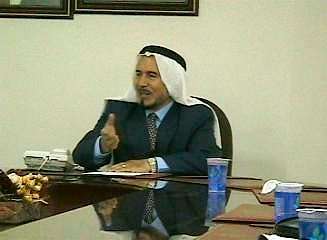Ahmad Hemylayem,
Minister of Religious Affairs, Jordan
17-sep-03, 9:30 am
Our first meeting today is with Ahmad Hemylayem,
Minister of Awqaf (Religious Affairs).
(Awqaf is literally translated "endowment".)
We are warmly greeted and ushered to a meeting room.
While we wait for the Minister, Bashar explains that the Mufti is
responsible for doctrinal issues and the Minister of Awqaf handles
administrative affairs.
We talk for awhile with the Minister's aide, with Bashar translating.
We exchange pleasantries about seeking common ground.
The aide emphasizes Mohammed as a merciful man, and that Sharia's goal
is to have peace enter the hearts of all people.

The Minister arrives and apologizes for being late.
He greets us warmly, and
recalls that he and his wife visited the U.S. for a month in the 80's.
We are served water and tea.
(We would be served tea or coffee at every meeting in the Middle East.)
Bashar introduces us, and we are introduced to 4 of the Minister's
staffers, including his Director of Public Relations and Media.
The Minister cites the Koran regarding inclusiveness and tolerance,
including a long quote from chapter 4, "the Woman", and one we
heard often, "We made you into nations and tribes that you
may know each other."
He told the story of how Mohammed stood up in respect when a Jewish funeral
procession passed by.
When asked about Western secularism, he
says "if secularism
is to spread science and knowledge, we're all for it. But if
it's a departure from religion and morality and the family,
and if it fosters disrespect between men and women, are against it."
He's not wishy-washy. He states that extremism in Afghanistan started
because of the U.S.-Russia conflict. He denounces the killing
of innocent people, including Jews, but he also denounces
some Israeli policies, particularly home demolition.
"We in the Hashemite Kingdom have good relations with the U.S."
He feels that Jordan has a difficult time "keeping the middle ground" in
the region.
When asked about Jordanian response to terrorism,
he denounces acts of Muslim violence as well as Israeli.
There are, he says, extremes in all religions.
He is concerned with "aggression and injustice towards weak peoples
and small nations", a clear reference to the Palestinians.
Americans, he says, are sensitive to these concerns:
"We ask American people to achieve what they believe in their hearts."
The inequity between weak and strong has led to the current extremism.
Of Iraq he says
that Jordanians feared Saddam Hussein, but that the
current situation is just as fearful.
We feel that this meeting is somewhat ceremonial in nature, partly because
of the translation process.
After the meeting we are escorted to the Minister's private office.
He surreptitiously asks Bashar, as we later learn, if we would be offended
by the gift of a Koran.
Learning otherwise, he presents us with beautiful copies, in Arabic, of
the Koran.
In the Middle East, this is a very significant gift.
|